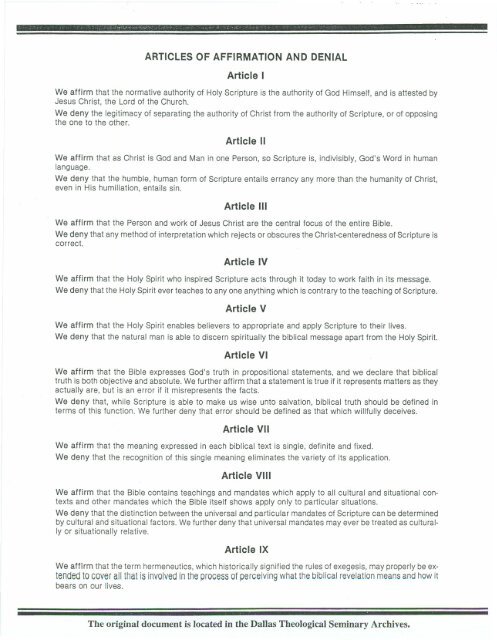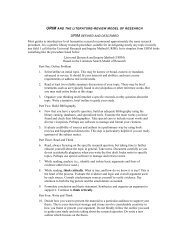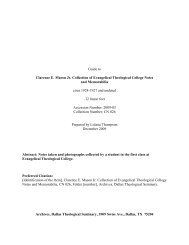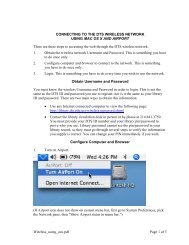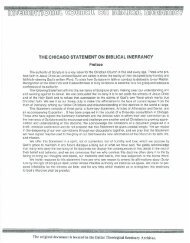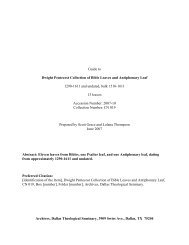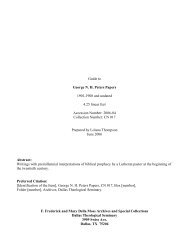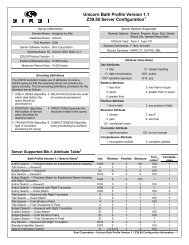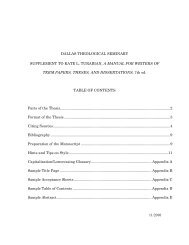Chicago Statement on Biblical Hermeneutics - Dallas Theological ...
Chicago Statement on Biblical Hermeneutics - Dallas Theological ...
Chicago Statement on Biblical Hermeneutics - Dallas Theological ...
Create successful ePaper yourself
Turn your PDF publications into a flip-book with our unique Google optimized e-Paper software.
I-ARTICLESOF AFFIRMATI"ONAND DENIALArticle IWe affirm that the normative authority of Holy Scripture is the authority of God Himself, and is attested byJesus Christ, the Lord of the Church.We deny the legitimacy of separating the authority of Christ from the authority of Scripture, or of opposingthe <strong>on</strong>e to the other.Article IIWe affirm that as Christ is God and Man in <strong>on</strong>e Pers<strong>on</strong>, so Scripture is, indivisibly, God's Word in humanlanguage.We deny that the humble, human form of Scripture entails errancy any more than the humanity of Christ,even in His humiliati<strong>on</strong>, entails sin.Article IIIWe affirm that the Pers<strong>on</strong> and wo"rkof Jesus Christ are the central focus of the entire Bible.We deny that any method of interpretati<strong>on</strong> which rejects or obscures the Christ-centeredness of Scripture iscorrect.Article IVWe affirm that the Holy Spirit who inspired Scripture acts through it today to work faith in its message.We deny that the Holy Spirit ever teaches to any<strong>on</strong>e anything which is c<strong>on</strong>trary to the teaching of Scripture.Article VWe affirm that the Holy Spirit enables believers to appropriate and apply Scripture to their lives.We deny that the natural man is able to discern spiritually the biblical message apart from the Holy Spirit.Article VIWe affirm that the Bible expresses God's truth in propositi<strong>on</strong>al statements, and we declare that biblicaltruth is both objective and absolute. We further affirm that a statement is true if it represents matters as theyactually are, but is an error if it misrepresents the facts.We deny that, while Scripture is able to make us wise unto salvati<strong>on</strong>, biblical truth should be defined interms of this functi<strong>on</strong>. We further deny that error should be defined as that which willfully deceives.Article VIIWe affirm that the meaning expressed in each biblical text is single, definite and fixed.We deny that the recogniti<strong>on</strong> of this single meaning eliminates the variety of its applicati<strong>on</strong>.ArticleWe affirm that the Bible c<strong>on</strong>tains teachings and mandates which apply to all cultural and situati<strong>on</strong>al c<strong>on</strong>.texts and other mandates which the Bible itself shows apply <strong>on</strong>ly to particular situati<strong>on</strong>s.We deny that the distincti<strong>on</strong> between the universal and particular mandates of Scripture can be determinedby cultural and situati<strong>on</strong>al factors. We further deny that universal mandates may ever be treated as culturallyor situati<strong>on</strong>ally relative.VIIIArticle IXWe affirm that the term hermeneutics, which historically signified the rules of exegesis, may properly be extendedtoGoverall that is involvedinthe processof perceivingwhatthebiblicalrevelati<strong>on</strong>meansand how itbears <strong>on</strong> our lives.The original document is located in the <strong>Dallas</strong> <strong>Theological</strong> Seminary Archives.


